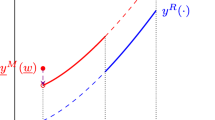Abstract
There exist social choice rules for which every manipulation benefits everyone. This paper constructs a large variety of rules with this property and provides two characterizations of such rules.
Similar content being viewed by others
Notes
For these examples, we thank Malte Lierl and Asha Sundaram.
References
Bandyopadhyay T (1982) Coalitional power structure without the Pareto principle. Math Soc Sci 2:55–64
Border KC (1983) Social welfare functions for economic environments with and without the Pareto principle. J Econ Theory 29:205–216
Campbell DE (1989) Wilson’s theorem for economic environments and continuous social preferences. Soc Choice Welf 6:315–323
Campbell DE (1990) Intergenerational social choice without the Pareto principle. J Econ Theory 50:414–423
Campbell DE, Kelly JS (1993) t or \(1 - t\). That is the question. Econometrica 61:1355–1365
Campbell DE, Kelly JS (2002) Impossibility theorems in the Arroviam framework. In: Arrow KJ, Sen AK, Suzumura K (eds) Handbook of social choice and welfare, vol 1. North-Holland, pp 35–94
Campbell DE, Kelly JS (2003) On the Arrow and Wilson impossibility theorems. Soc Choice Welf 20:273–281
Campbell DE, Kelly JS (2010a) Strategy-proofness and weighted majority voting. Math Soc Sci 60:15–23
Campbell DE, Kelly JS (2010b) Losses due to the manipulation of social choice rules. Econ Theory 45:453–467
Campbell DE, Kelly JS (2013a) Strategy-proofness on the non-Paretian domain
Campbell DE, Kelly JS (2013b) Strategy-proofness on the non-Paretian domain: II. Range results
Fountain J, Suzumura K (1982) Collective choice rules without the Pareto principle. Int Econ Rev 23:299–308
Gekker R (1988) Veto theorems with expansion consistency conditions and without the weak Pareto principle. Math Soc Sci 15:73–80
Gibbard A (1973) Manipulation of voting schemes: a general result. Econometrica 41:587–601
Gibson LR, Powers RC (2009) The NIP graph of a social welfare function. Soc Choice Welf 33:415–421
Kelly JS (1990) Impossibility results with resoluteness. Econ Lett 34:15–19
Kelsey D (1984) Acyclic choice without the Pareto principle. Rev Econ Stud 51:693–699
Lensberg T, Thomson W (1988) Characterizing the Nash bargaining solution without Pareto-optimality. Soc Choice Welf 5:247–259
Malawski M, Zhou L (1994) A note on social choice theory without the Pareto principle. Soc Choice Welf 11:103–107
Munkres J (1975) Topology: a first course. Prentice-Hall. Englewood Cliffs
Pattanaik PK (1976) Threats, counterthreats and strategic voting. Econometrica 44:91–103
Powers RC (2001) Nondictatorially independent pairs and Pareto. Soc Choice Welf 18:817–822
Powers RC, White JM (2008) Wilson’s theorem for consensus functions on hierarchies. Discrete Appl Math 156:1321–1329
Satterthwaite MA (1975) Strategy-proofness and Arrow’s conditions: existence and correspondence theorems for voting procedures and social welfare functions. J Econ Theory 10:187–217
Tanaka Y (2003) A necessary and sufficient condition for Wilson’s impossibility theorem with strict non-imposition. Econ Bull 4:1–8
Tanaka Y (2007) A topological approach to Wilson’s impossibility theorem. J Math Econ 43:184–191
Thomson W (1999) Welfare-domination under preference-replacement: a survey and open questions. Soc Choice Welf 16:373–394
Wilson RB (1972) Social choice without the Pareto principle. J Econ Theory 5:478–486
Author information
Authors and Affiliations
Corresponding author
Rights and permissions
About this article
Cite this article
Campbell, D.E., Kelly, J.S. Universally beneficial manipulation: a characterization. Soc Choice Welf 43, 329–355 (2014). https://doi.org/10.1007/s00355-013-0790-7
Received:
Accepted:
Published:
Issue Date:
DOI: https://doi.org/10.1007/s00355-013-0790-7




